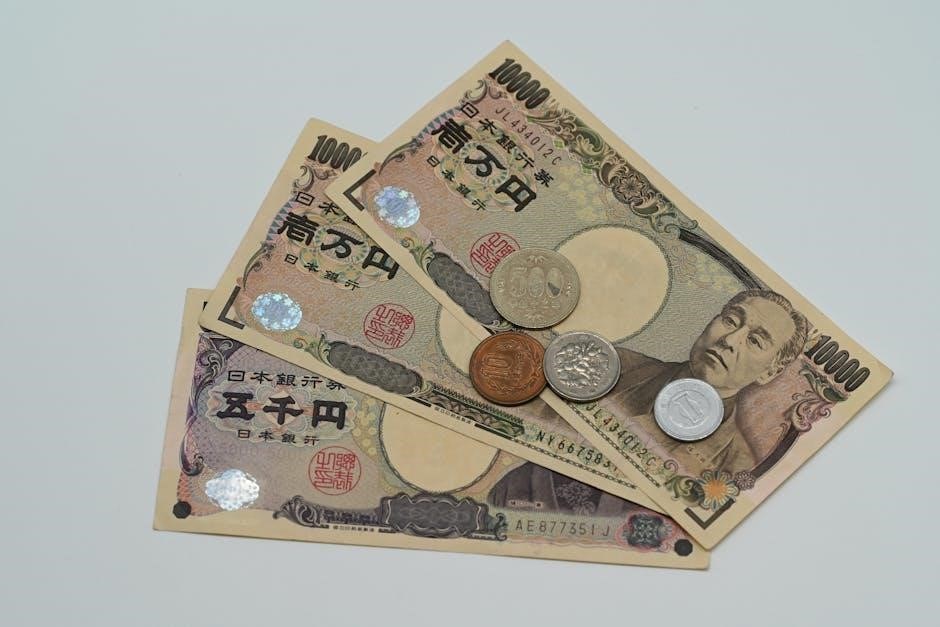The foreign exchange manual provides a practical guide to understanding exchange rates and regulations, including
- key terms
and concepts, to help individuals and businesses navigate international trade and finance effectively always.
Overview of Foreign Exchange
The foreign exchange market is a global decentralized market where individuals, businesses, and institutions trade currencies. The market determines the exchange rates for currencies, which can fluctuate constantly due to various economic and political factors. Understanding the foreign exchange market is crucial for individuals and businesses that engage in international trade and investment. The market is influenced by factors such as supply and demand, inflation rates, and interest rates. Participants in the foreign exchange market include banks, currency traders, and investors. The foreign exchange market operates 24 hours a day, five days a week, and is the largest financial market in the world, with a daily trading volume of over $6 trillion. The market provides liquidity and facilitates international trade and investment by enabling the exchange of currencies. Various economic indicators and events can impact the market.
Importance of Foreign Exchange Manual
The foreign exchange manual is essential for individuals and businesses engaged in international trade and investment. It provides a comprehensive guide to understanding exchange rates, regulations, and procedures. The manual helps users navigate the complex foreign exchange market, avoiding potential pitfalls and ensuring compliance with relevant laws and regulations. By following the guidelines outlined in the manual, users can minimize risks and maximize benefits associated with foreign exchange transactions. The manual is particularly useful for those new to foreign exchange, as it explains key concepts and terminology in a clear and concise manner. Additionally, the manual serves as a reference tool for experienced users, providing updates on changes in regulations and market conditions. Overall, the foreign exchange manual is a valuable resource for anyone involved in international trade and investment, helping to facilitate smooth and successful transactions. The manual is widely used.

Foreign Exchange Regulations
Foreign exchange regulations govern international trade and investment, with rules and guidelines to ensure compliance and stability in the market always and effectively online.
State Bank of Pakistan Foreign Exchange Manual
The State Bank of Pakistan Foreign Exchange Manual is a comprehensive guide that outlines the rules and regulations for foreign exchange transactions in Pakistan, providing a framework for individuals and businesses to conduct international trade and investment. The manual is designed to facilitate the flow of foreign exchange and promote economic growth, while also ensuring compliance with relevant laws and regulations. It covers various aspects of foreign exchange, including imports, exports, and remittances, and provides guidance on procedures and documentation requirements. The manual is an essential resource for anyone involved in foreign exchange transactions in Pakistan, including banks, financial institutions, and individuals. It is regularly updated to reflect changes in regulations and market conditions, and is available on the State Bank of Pakistan’s website for easy access. The manual is a key component of Pakistan’s foreign exchange regulatory framework.
Implementation of Quality Standards on Imports
The implementation of quality standards on imports is a crucial aspect of foreign exchange regulations, ensuring that goods entering the country meet certain standards of quality and safety. This is achieved through the establishment of quality control measures, such as testing and inspection procedures, to verify compliance with relevant standards. The State Bank of Pakistan’s Foreign Exchange Manual provides guidance on the implementation of quality standards on imports, including the requirement for importers to obtain certifications and comply with relevant regulations. This helps to protect consumers and prevent the importation of substandard goods, while also promoting fair trade practices and compliance with international standards. The manual outlines the procedures for implementing quality standards on imports, including the role of regulatory agencies and the responsibilities of importers. Quality standards are regularly reviewed and updated to reflect changing market conditions.

Foreign Exchange Transactions
Foreign exchange transactions involve buying and selling currencies, with NSD accepting instructions according to regulations, facilitating international trade and finance activities always online.
NSD Foreign Exchange Instructions
NSD foreign exchange instructions are guidelines for facilitating international trade and finance activities, enabling individuals and businesses to engage in foreign exchange transactions efficiently. The instructions outline the procedures for buying and selling currencies, as well as the requirements for submitting foreign exchange instructions. According to the regulations, NSD accepts foreign exchange instructions and transfer instructions, allowing for the settlement of international transactions. The instructions also provide information on the necessary documentation and compliance requirements. By following these instructions, individuals and businesses can ensure that their foreign exchange transactions are conducted in a secure and compliant manner. The NSD foreign exchange instructions are an essential component of the foreign exchange manual, providing a framework for navigating the complexities of international trade and finance. The instructions are regularly updated to reflect changes in regulations and market conditions.
Foreign Exchange Transfer Instructions
The foreign exchange transfer instructions are a crucial aspect of the foreign exchange manual, outlining the procedures for transferring funds internationally. These instructions provide detailed information on the requirements for initiating and processing foreign exchange transfers, including the necessary documentation and compliance requirements. The instructions also cover the different types of transfer methods, such as wire transfers and online transfers, and the associated fees and charges. Additionally, the instructions provide guidance on the exchange rates and conversion processes, ensuring that individuals and businesses can make informed decisions when transferring funds internationally. By following these instructions, users can ensure that their foreign exchange transfers are conducted efficiently and securely, minimizing the risk of errors or delays. The instructions are designed to be user-friendly and accessible, making it easier for individuals and businesses to navigate the complexities of foreign exchange transfers.

Registration of Foreign Investments
Registration involves documenting foreign investments with relevant authorities using specific documents and forms always correctly online.
Bangko Sentral Registration Document
The Bangko Sentral Registration Document is a crucial component of the foreign exchange manual, providing a standardized framework for registering foreign investments and loans; This document is issued by the Bangko Sentral ng Pilipinas, the central bank of the Philippines, and serves as evidence of registration, allowing transacting parties to access foreign exchange resources. The registration process involves submitting the necessary documents and forms, which are then reviewed and verified by the relevant authorities. The Bangko Sentral Registration Document is an essential tool for individuals and businesses engaged in international trade and finance, as it facilitates the settlement of foreign investments and loans. By using this document, parties can ensure compliance with regulatory requirements and avoid potential penalties or fines. The document is a key aspect of the foreign exchange manual, providing a clear and efficient process for registration.

Financial Institutions and Foreign Exchange
Oracle Financial Services enables institutions to build customer intimacy and competitive advantage through cost-effective solutions in foreign exchange markets always using technology effectively online.
Oracle Financial Services Solutions
Oracle Financial Services provides solutions to help financial institutions manage foreign exchange transactions and other financial activities. The company offers a range of products and services, including software and consulting services, to help institutions improve their operations and reduce costs. Oracle Financial Services solutions are designed to help institutions comply with regulatory requirements and industry standards, such as anti-money laundering and know-your-customer regulations. The company’s solutions also provide real-time monitoring and reporting capabilities, enabling institutions to quickly identify and respond to potential issues. By using Oracle Financial Services solutions, financial institutions can improve their efficiency, reduce their risk, and provide better services to their customers. Oracle Financial Services has a global presence, with offices and customers in many countries around the world, and is a leading provider of financial services technology.
Role of Central Banks in Foreign Exchange
Central banks play a crucial role in foreign exchange by regulating and supervising the foreign exchange market. They set monetary policies, including interest rates and inflation targets, which affect exchange rates. Central banks also manage their country’s foreign exchange reserves, buying or selling currencies to influence exchange rates. Additionally, they provide liquidity to the foreign exchange market and act as lenders of last resort. The Bangko Sentral ng Pilipinas, for example, is responsible for maintaining monetary stability and regulating the foreign exchange market in the Philippines. Central banks also work together with other financial institutions to promote financial stability and prevent crises. They use various tools, such as open market operations and foreign exchange interventions, to achieve their policy objectives and maintain a stable financial system. This helps to promote economic growth and stability.
